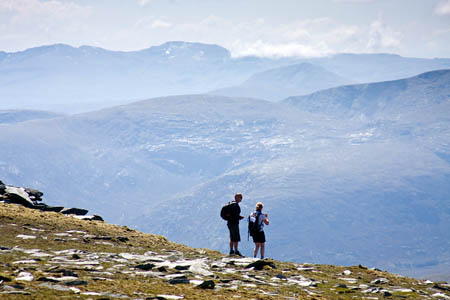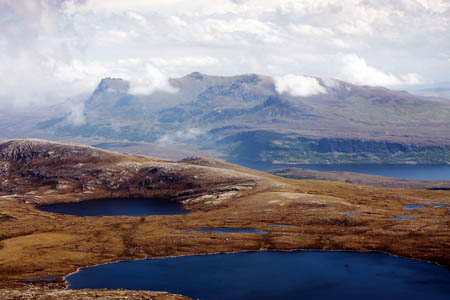The Cairngorms national park should be extended westwards and a total ban imposed on the building of windfarms in the area.
That’s the view of Britain’s biggest walkers’ charity which briefed MSPs ahead of this evening’s debate on wild land in the Scottish Parliament.
The Ramblers said the Monadhliath Mountains should be brought into the Cairngorms park and the whole area declared a world heritage site.
Today’s debate on endangered species and wild land conservation, lodged by MSP Murdo Fraser, has gained the support of SNP, Labour, Conservative and independent MSPs.
Conservation charity the John Muir Trust, which owns several mountains including much of Britain’s highest peak Ben Nevis, welcomed the debate.
Stuart Brooks, chief executive of the trust, said: “[The] debate is a positive step forward for the trust’s wild land campaign.
“This is the Scottish Government’s Year of Natural Scotland, so this discussion is timely.
“We welcome the cross-party support this motion has attracted. This debate should be a step up to a nationwide debate on the rapid loss of Scotland’s wild land as a result of unsuitable development.
“We’re running out of time. Two years ago, when we delivered our petition to Parliament calling for a wild land designation, [Scottish Natural Heritage] warned of the dangers of leaving it too late to take action.
“Since then, development pressure on our wild land has grown more intense. With the proportion of wild land left in Scotland shrinking at an alarming rate, this debate should be a wake-up call to politicians across the political spectrum to take action urgently.”
But the Ramblers said: “We are supportive of the proposal from the John Muir Trust to create a new environmental designation to protect wild land, but are concerned that the process for establishing such a designation, including new legislation, will take too long and too small an area of Scotland will be protected for its wild land value.
“There is a need to emphasise that Scotland is a country that is renowned across the world for the beauty of its scenery.
“The landscapes which form the very essence of this reputation are essentially wild and relatively unmodified by human activity.”
In its formal submission to the Scottish Parliament, the Ramblers said: “The most serious threat to wild land at present is from Scottish and UK Government energy policies, notably the promotion of large scale windfarm development in areas of wild land value.
“Such developments need to be curtailed, with more emphasis given to offshore development.
“Of immediate concern are threats from windfarm development close to the western boundary of the Cairngorms National Park. This boundary needs to be extended towards Fort Augustus and the whole national park put forward for designation as a world heritage site.”
The Ramblers said development pressure outside the boundary threatens the integrity of the national park as a whole.
“This boundary is far too close to the central part of the Cairngorms massif, the Cairn Gorm-Ben MacDui and Braeriach-Cairn Toul plateaux,” they added.
“These plateaux are the finest examples that we have in the UK of truly wild, unspoilt mountain landscape, akin to the wilderness areas of northern Scandinavia and other arctic lands.
“It is extraordinary that the views from this superb tract of land, which provides an exceptional outdoor recreation experience, is in danger of being compromised by proposed windfarms, such as the Stronelairg and Allt Duine proposals, located close to the park’s western boundary.
“This week, with superb snow cover in the Cairngorms, a magnificent ski-tour around all four of the high peaks can be enjoyed, with the adjacent, rolling hills of the Monadhliath spreading out to the west, beyond the western boundary.
“Surely nobody with any sensitivity towards our landscape can support the erection of 443ft wind turbines in such a view, turning one of the UK’s finest wild landscapes into an industrial site?”
The charity also said, if a new environmental designation designed to protect wild land is not agreed at present, the Scottish Government should consider whether wild land protection needs can be built into planning policies as a whole, as well as into the financial incentives which underpin much of what happens on the land.
It added that subsidies should be scrapped for large scale onshore windfarm development. Any energy subsidies should instead be directed towards the support of small-scale turbine developments run by farmers, crofters and communities and large offshore windfarm development.
The debate in the Scottish Parliament is due to begin at 5pm.


OldManoftheHills
07 March 2013When oil runs out and all the lights turn off we might be sorry we had not built more windfarms to give us elecricity. As a keen walker and climber (and sailor) I see nothing wrong in suitable windfarms and think much of the objection is that British curse of Nymbyism.
Wind turbines need a windy spot such as hills and are quite majestic which is not to say careful planning is not required.
I love technology such as my boots axe and crampons and the bus or car that gets me there. I would hardly wish to go back to nature and wander Cairgorm plateau stark naked. Not all the works of man are desecration.
Bernard Snoglgf
08 March 2013Oh give it a rest. You're fooling nobody on this site. If you cared about the environment you want us to build new nuclear and invest in thorium research. You cannot run an economy, or a household for that matter, on a sporadic supply of highly expensive electricity which does nothing to ween us off things like coal. You forget little things like the environment, peat, birds, tourism, as well - these things provide real jobs which turbines destory.
Your'e either living in LaLa land or your snouts in the subsidy trough. It's pathetic.